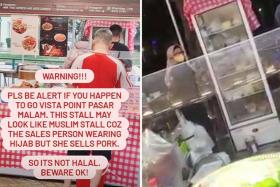Patrons concerned by stalls without halal certification at Geylang Serai Bazaar
Since its opening last Friday, this year's annual Ramadan bazaar at Geylang Serai has been troubled by controversy.
Earlier this week, 22 unlicensed food handlers and illegal workers were nabbed in a joint raid by the Ministry of Manpower, National Environment Agency and Singapore Police Force.
But even during its first weekend of operation, concerned customers had raised concerns on how many food stalls at the Geylang Serai Bazaar were halal-certified (referring to food prepared according Islamic requirements).
According to The Halal Food Blog, a popular website that reviews halal establishments in Singapore, more than 1,000 people have raised concerns about the food stalls there.
Madam Jumaiyah Mahathir, managing director of Chooosie Group, the managing company for Halalfoodhunt and The Halal Food Blog, told The New Paper on Wednesday: "The overwhelming comments from both the public and stores compelled us to create a list of halal stalls. We had over 1,000 people asking about the halal certification for some food stalls and this was a huge number compared to last year when we got zero (queries)."
She and her team went to the bazaar to ask stall owners if they were halal, halal-certified or were Muslim owned. Of the 170 stalls they informally polled, nearly half were not Muslim-owned and not halal-certified.
One of the contractors involved with the bazaar had earlier told TNP that stallholders had been told they should at least have a Muslim partner if the stall is selling food.
Tenants were also told to respect the significance of the Ramadan bazaar, said Mr Muhammad Mustaffa, head of Enniche, one of the events companies that helped to recruit stallholders for the bazaar.
"I made sure to inform tenants who want to sell food to have a Muslim partner to guarantee that the items would be halal and that the people handling the food must be Muslims," he added, saying that with so many stalls at the bazaar, it was difficult to enforce the rule.
The Islamic Religious Council of Singapore (Muis) issues halal certificates for temporary stalls.
But the certificates are only issued to establishments which already have an existing Muis halal certificate.
Muis told TNP that the application can be made online and the certificate is generally issued within seven days.
The cost of the halal certificate for temporary stalls depends on the duration applied for, starting from $75 for a period of seven days.
Minister-in-Charge of Muslim Affairs, Dr Yaacob Ibrahim, who spoke to reporters on the sidelines of the Madrasah Student Awards yesterday, said: "The Ramadan bazaar is an important part of our tradition, it enriches not just our religious life but also the social life of Singaporeans.
"I leave it to the organisers to decide what is best to ensure a proper variety of food, but at the end of the day I always believe that as Muslims, wherever we patronise, we have to do our own due diligence."
A vice-president of the Singapore Malay Chamber of Commerce and Industry, Mr Azhar Othman, told TNP that the halal issue is a serious matter and that stalls should be halal-certified or halal-compliant.
He said: "(The) bazaar in Geylang during Ramadan is a brand on its own just like (the celebrations for) Chinese New Year in Chinatown, Deepavali in Little India and Christmas in Orchard Road.
"The uniqueness to make it halal-compliant sets a standard on its own and will definitely attract tourists."- ADDITIONAL REPORTING BY LINETTE HENG
Get The New Paper on your phone with the free TNP app. Download from the Apple App Store or Google Play Store now


